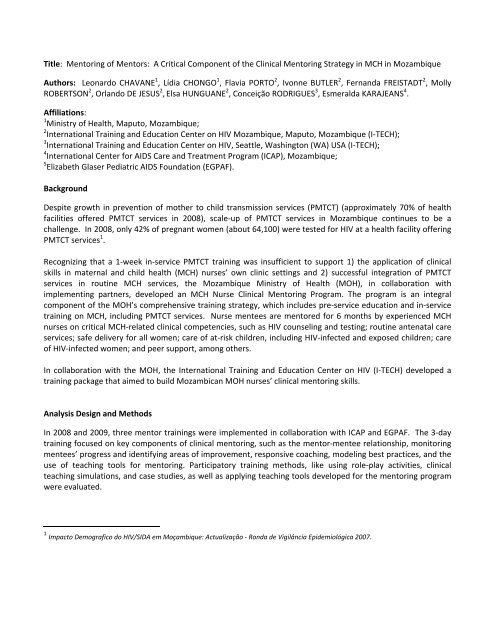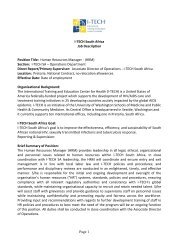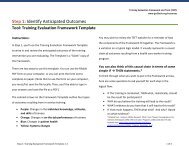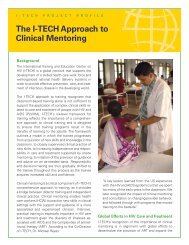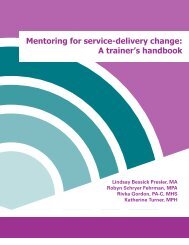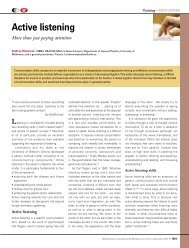Mentoring of Mentors: A Critical Component of the Clinical ... - I-TECH
Mentoring of Mentors: A Critical Component of the Clinical ... - I-TECH
Mentoring of Mentors: A Critical Component of the Clinical ... - I-TECH
You also want an ePaper? Increase the reach of your titles
YUMPU automatically turns print PDFs into web optimized ePapers that Google loves.
Title: <strong>Mentoring</strong> <strong>of</strong> <strong>Mentors</strong>: A <strong>Critical</strong> <strong>Component</strong> <strong>of</strong> <strong>the</strong> <strong>Clinical</strong> <strong>Mentoring</strong> Strategy in MCH in Mozambique<br />
Authors: Leonardo CHAVANE 1 , Lídia CHONGO 1 , Flavia PORTO 2 , Ivonne BUTLER 2 , Fernanda FREISTADT 2 , Molly<br />
ROBERTSON 2 , Orlando DE JESUS 2 , Elsa HUNGUANE 2 , Conceição RODRIGUES 3 , Esmeralda KARAJEANS 4 .<br />
Affiliations:<br />
1 Ministry <strong>of</strong> Health, Maputo, Mozambique;<br />
2 International Training and Education Center on HIV Mozambique, Maputo, Mozambique (I‐<strong>TECH</strong>);<br />
3 International Training and Education Center on HIV, Seattle, Washington (WA) USA (I‐<strong>TECH</strong>);<br />
4 International Center for AIDS Care and Treatment Program (ICAP), Mozambique;<br />
5 Elizabeth Glaser Pediatric AIDS Foundation (EGPAF).<br />
Background<br />
Despite growth in prevention <strong>of</strong> mo<strong>the</strong>r to child transmission services (PMTCT) (approximately 70% <strong>of</strong> health<br />
facilities <strong>of</strong>fered PMTCT services in 2008), scale‐up <strong>of</strong> PMTCT services in Mozambique continues to be a<br />
challenge. In 2008, only 42% <strong>of</strong> pregnant women (about 64,100) were tested for HIV at a health facility <strong>of</strong>fering<br />
PMTCT services 1 .<br />
Recognizing that a 1‐week in‐service PMTCT training was insufficient to support 1) <strong>the</strong> application <strong>of</strong> clinical<br />
skills in maternal and child health (MCH) nurses’ own clinic settings and 2) successful integration <strong>of</strong> PMTCT<br />
services in routine MCH services, <strong>the</strong> Mozambique Ministry <strong>of</strong> Health (MOH), in collaboration with<br />
implementing partners, developed an MCH Nurse <strong>Clinical</strong> <strong>Mentoring</strong> Program. The program is an integral<br />
component <strong>of</strong> <strong>the</strong> MOH’s comprehensive training strategy, which includes pre‐service education and in‐service<br />
training on MCH, including PMTCT services. Nurse mentees are mentored for 6 months by experienced MCH<br />
nurses on critical MCH‐related clinical competencies, such as HIV counseling and testing; routine antenatal care<br />
services; safe delivery for all women; care <strong>of</strong> at‐risk children, including HIV‐infected and exposed children; care<br />
<strong>of</strong> HIV‐infected women; and peer support, among o<strong>the</strong>rs.<br />
In collaboration with <strong>the</strong> MOH, <strong>the</strong> International Training and Education Center on HIV (I‐<strong>TECH</strong>) developed a<br />
training package that aimed to build Mozambican MOH nurses’ clinical mentoring skills.<br />
Analysis Design and Methods<br />
In 2008 and 2009, three mentor trainings were implemented in collaboration with ICAP and EGPAF. The 3‐day<br />
training focused on key components <strong>of</strong> clinical mentoring, such as <strong>the</strong> mentor‐mentee relationship, monitoring<br />
mentees’ progress and identifying areas <strong>of</strong> improvement, responsive coaching, modeling best practices, and <strong>the</strong><br />
use <strong>of</strong> teaching tools for mentoring. Participatory training methods, like using role‐play activities, clinical<br />
teaching simulations, and case studies, as well as applying teaching tools developed for <strong>the</strong> mentoring program<br />
were evaluated.<br />
1 Impacto Demografico do HIV/SIDA em Moçambique: Actualização ‐ Ronda de Vigilância Epidemiológica 2007.
The training package includes <strong>the</strong> following:<br />
• A reference manual for <strong>the</strong> mentor to use as a resource, which describes key components <strong>of</strong> clinical<br />
mentoring and tips for effective teaching and systems‐streng<strong>the</strong>ning activities to support <strong>the</strong> application<br />
and delivery <strong>of</strong> MCH services.<br />
• A rotation guide for <strong>the</strong> mentor with detailed instructions to guide her during onsite training in <strong>the</strong><br />
different sectors <strong>of</strong> MCH and during <strong>the</strong> follow‐up <strong>of</strong> nurse mentees in <strong>the</strong>ir own clinic settings.<br />
• Observation instruments for each MCH sector were developed, which consisted <strong>of</strong> a list <strong>of</strong> MOH‐<br />
defined competencies that should be achieved during <strong>the</strong> clinic rotation at each sector <strong>of</strong> MCH services.<br />
Competencies complement learning objectives <strong>of</strong> <strong>the</strong> pre‐service and in‐service trainings for MCH<br />
nurses. This instrument helped <strong>the</strong> mentors focus <strong>the</strong>ir teaching during clinical practice and identified<br />
areas for mentees’ improvement.<br />
• O<strong>the</strong>r teaching materials developed include teaching and learning aids for mentors and mentees on<br />
clinical skills; job aids for mentors and follow‐up tools.<br />
Results:<br />
• Sessions that had practical application components, such as role plays and modeling <strong>of</strong> best practices using<br />
<strong>the</strong> mentoring tools, were effective methods for learning.<br />
• Revising <strong>the</strong> observation tools with <strong>the</strong> group <strong>of</strong> future mentors proved to be effective in educating <strong>the</strong><br />
mentors and assuring that <strong>the</strong>y fully understood <strong>the</strong> use and purpose <strong>of</strong> <strong>the</strong> tools, including how to fill <strong>the</strong>m<br />
out and compile <strong>the</strong> data to assess progress <strong>of</strong> each mentee.<br />
• The mentors had some difficulty using <strong>the</strong> observation tools on a daily basis due to <strong>the</strong>ir o<strong>the</strong>r duties at <strong>the</strong><br />
clinics which included maintaining o<strong>the</strong>r data‐collection tools under <strong>the</strong>ir purview as part <strong>of</strong> routine MCH<br />
consultations.<br />
• The mentors demonstrated gaps in essential clinical knowledge and skills needed to provide quality MCH<br />
care.<br />
• The rotation guide was a useful resource in orienting and guiding <strong>the</strong> mentors during onsite teaching and<br />
ensuring consistency with <strong>the</strong> learning objectives <strong>of</strong> <strong>the</strong> in‐service training.<br />
Recommendations and Conclusion:<br />
The success <strong>of</strong> this program depends entirely on <strong>the</strong> clinical and teaching/mentoring competencies <strong>of</strong> <strong>the</strong> MCH<br />
nurse mentors and <strong>the</strong> time <strong>the</strong>y have available to dedicate to this role and to implementing activities. The<br />
selection criteria for nurse mentors should be more rigorous and increased effort could be placed on upgrading<br />
<strong>the</strong> clinical and mentoring skills <strong>of</strong> those selected as mentors, in addition to creating conditions where <strong>the</strong>y can<br />
fully assume <strong>the</strong> mentoring role.<br />
A more comprehensive training approach is needed for nurse mentors to include an upgrade <strong>of</strong> clinical skills and<br />
a “mentoring <strong>of</strong> mentors” strategy, based on <strong>the</strong> same training methodology used for mentoring nurse mentees.<br />
The MOH’s partners can be an important resource to facilitate <strong>the</strong> implementation <strong>of</strong> such strategies, as <strong>the</strong>y<br />
already count on experienced clinical mentors who can devote <strong>the</strong>ir time and resources to build mentors’ skills<br />
and mentor future Mozambican MCH nurse mentors.


